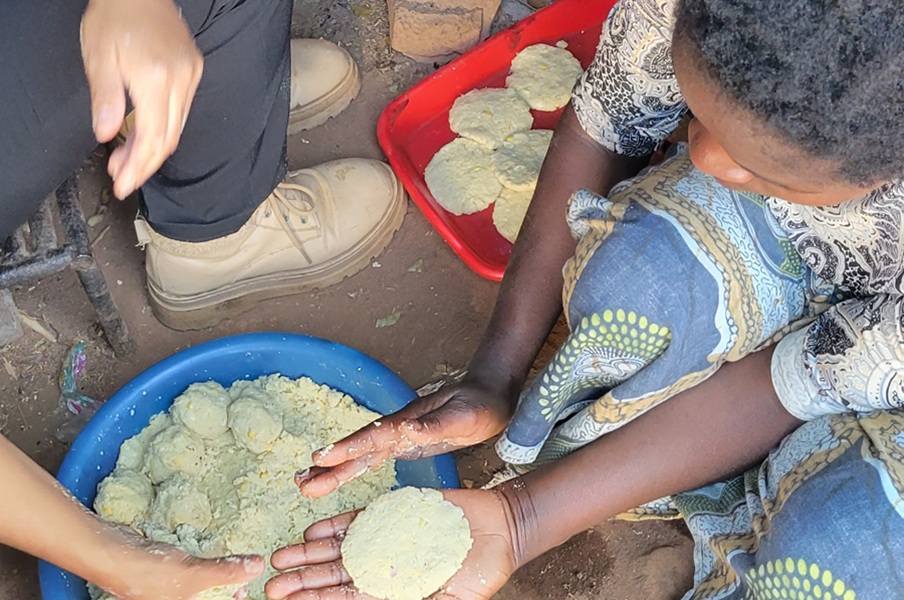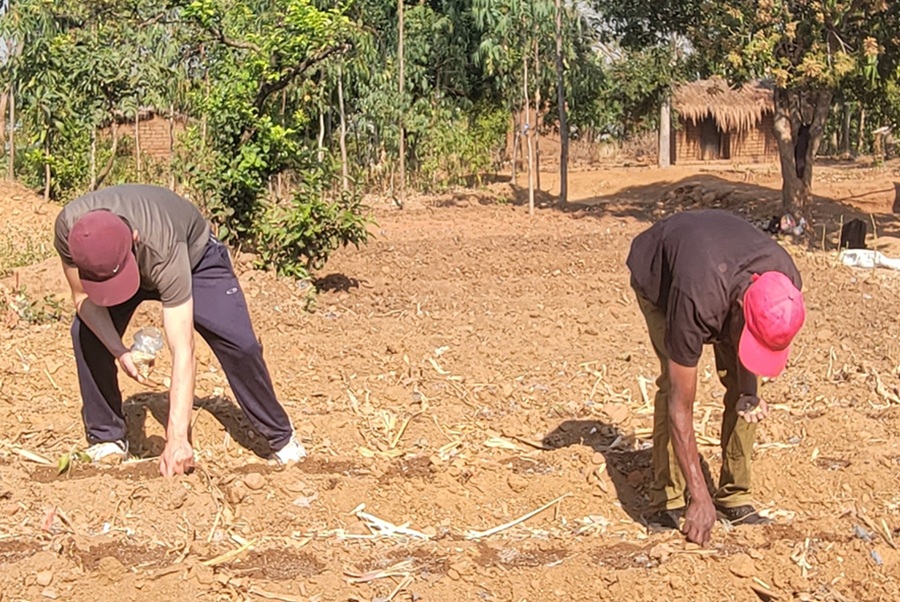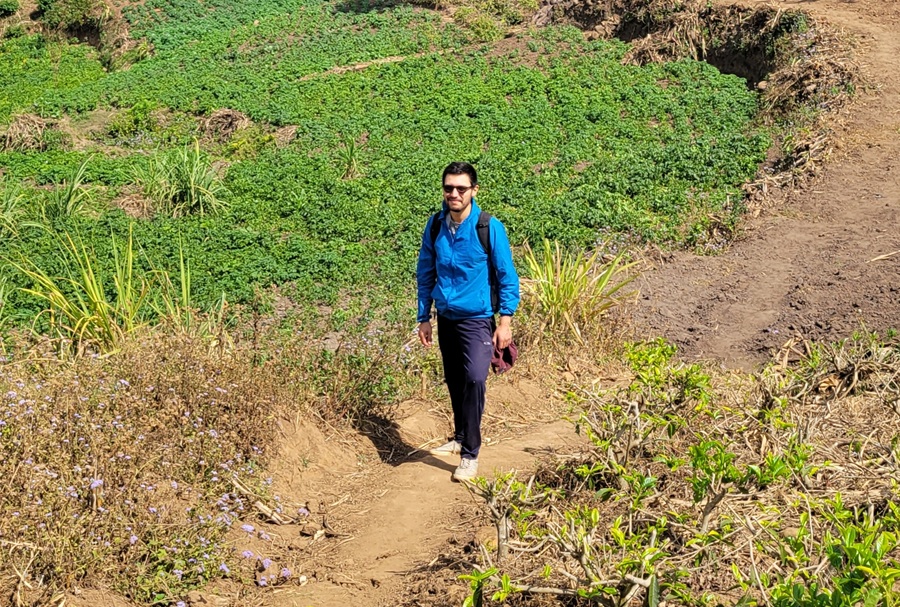A better word to a better world: let’s learn a bit of Chichewa!
 Jose and Angela with Richard Mpakati, preschools supervisor, and Carol Manyawa teacher of Mwai preschool.
Jose and Angela with Richard Mpakati, preschools supervisor, and Carol Manyawa teacher of Mwai preschool.
By José Inocencio Becerra Lagos, Colombia / Development Volunteer team April 2024
“If you talk to a man in a language he understands, that goes to his head.
If you talk to him in his language, that goes to his heart”
Nelson Mandela.
The first day I landed in Malawi I was very delighted. The landscapes, the people, the weather, but the energy itself that I felt in contact with the continent was awesome (beautiful = okongola). It gave me a big impulse to do, feel, find, whatever I wished, of course into the frames of cooperation, sustainability and respect, values that I learnt before and during the process. This impulse plus the open interest on the people kept me active on the desire of learning Chichewa, at least a short set of sentences and words to be able to communicate.
We are used to live in a very monolingual world whose globalisation is devaluing and rendering invisible the rich cultural diversity of the planet. If people from other cultures and languages want to interact with “Western” outsiders, they need to learn English; but the English speakers or the outsiders are not used to invest their time on learning the local languages. I happily decided to assume a position of learner, which was very well received by the Malawians. By means of Chichewa I grew friendships and moments which were special in such a way that I was receiving each word as a gift.
I enjoyed sharing time with Malawians. I sat down with them to eat and talk. Then I was willing to understand their topics, jokes, concerns, dreams, and points of view. I think it was just authentic curiosity, wish of interchange, well allocated into ranks of respect. Now, I want to share with you some words that could be useful if you go there (or interesting if you don’t.)
Nzanga means “my friend” (anzanga, in plural). Friendship is much nicer than paternalism. That’s why I advise you to use it when they call you “boss” (or bwana). I used it to say “I am not your boss, I can be your nzanga” or “I am just a customer, I am not the boss”. Aise, is also “friend”, but it is used much more often everywhere. With it they call to known or unknown people (especially men) quickly, without mentioning their names, i.e.: “aise, aise, wait a minute”.
By listening to their conversations, trying to acquire new words or to understand, I noticed that Malawians usually pay a lot of attention to the one they talk with. They show it by reacting to the others’ words by using exclamations like: “uh-huh!”, “ye-ye”, “sure”.
Even all the vowels are used to show basic replies. Yes is eya, not is ayi, but a harder not is iya. You use this one when you really disagree or prefer to reject a proposal. Then, they use to cut these answers to make them even shorter. The open mouth to “aa” means “not” or “that’s bad”; “e” means yes; “iiii” shows a negative surprise but is a funny way to say “not”; “oh” can be as in English and other languages a genuine surprised mood; “uh” is the same like “iiii” but less common.
The warm heart of Africa
In a personal way, I can say Malawians taught me a lot about solidarity. The country deserves the title of “warm heart of Africa”. An example is the beautiful word kalibu, which means “come and join us”. They will say it to you when they are eating or cooking and you walk near their place. Even if sometimes some people cannot cover all the meals or fulfil the nutrients that their bodies need, they honestly consider it is enough to share with you.
Like them, you will live closer to nature there. Sometimes surrounded by a forest or listening to the movement of a river (depending on the season). So, let’s see how you can name the four elements: fire is moto, water is madzi, air is mpweya and soil is dothi. Bowo is the water pump, where you need to go to bring the most precious resource in the universe in case your tap does not bring it. Malo is lot, plot, the piece of field where you can grow your own food. Trees is mitengo, in singular mtengo.
The most important word is zikomo: thank you. One less used version with a bit more of power is ndathokoza: “I appreciate it”. Good bye is tionana. A beautiful phrase is muyende bwino, which is something like “have a good journey”. They use it when you meet them on the pathway because they wish you arrive well to your nyumba (house).
Woman is mkazi, man is mamuna, child is mwana and children ana. In my neighbourhood I saw a lot of affection given by all the neighbours to the babies. So, sometimes they call a person by her/his kinship. For example, they didn’t say “Elisa” or “Jeremiah”, but “amá de Junior!” and “apá de Junior!” (“Junior’s mother!”, “Junior’s father!”).
God is Mulungu. They use to bless to the people who they meet, especially while saying goodbye. They announce it as Mulungu akudalitseni (“God bless you”). Church is mpingo, song or music is nyimbo (n + y sound like ñ in Spanish), palibe is nothing. Boh boh!, is a simple way to say “hi, how are you?”, to a person or a group. The young people only remember m’modzi, awiri, zitatu (1, 2, and 3), the elder know more numbers, but after three they usually say English words.
Malawi is a country of many languages
Chichewa is the most spoken language in Malawi, especially in central and southern regions. Tumbuka is very important in the North. With much fewer quantities of speakers, I remember people mentioned yao, sena, chingonde, lomhwe, and tonga. I lived in the South, in the district of Thyolo, but in the Northern border with Tanzania there are many more languages spoken by smaller communities.
Some tribes have lost or are losing their language. Apart from Chichewa and Tumbuka, I feel the rest ones are endangered or going to be in that position soon. English is the official language, some Malawians who are sons or grandsons of Indians speak Hindi. Also people from other Asian countries are bringing their languages to Malawi.
I hope you can make your period in that amazing country meaningful, with your own dictionary and your special list of memories and friends.
A bit more:
Mwadzuka bwanji?: Good morning, how are you?
Mwaswera bwanji?: Good afternoon, how are you?
Muli bwanji?: [Greeting in any moment of the day] + how are you?
Pang’ono: small or a few.
Pang’ono pang’ono: slowly or little by little.
Kwambiri: very or many.
Munthu / anthu: person / people.
Galu: dog.
Mphaka: cat.
Pusi: monkey.
Mbuzi: goat.
Nsomba: fish.
Phiri: mountain.
Mfumu: chief.
Azungu: White person.
Wakuda: Black person (some people think it is offensive).
Mphuzitsi/aphunzitsi: teacher / teachers.
Wophunzira / ophunzira: student / students.
Galimoto: car.
Njinga: bycicle.
Mutu: head.
Ufa: flour.
Mpunga: rice.
Zikomo kwambiri - Thank you very much!








